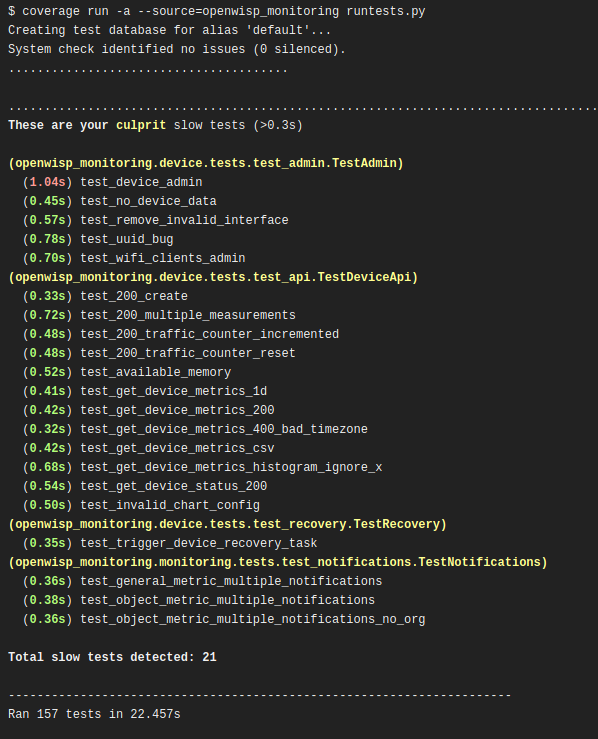Test Utilities
Note
This documentation page is aimed at developers who want to customize, change or extend the code of OpenWISP Utils in order to modify its behavior (e.g.: for personal or commercial purposes or to fix a bug, implement a new feature or contribute to the project in general).
If you aren't a developer and you are looking for information on how to use OpenWISP, please refer to:
openwisp_utils.tests.catch_signal
This method can be used to mock a signal call in order to easily verify that the signal has been called.
Usage example as a context-manager:
from openwisp_utils.tests import catch_signal
with catch_signal(openwisp_signal) as handler:
model_instance.trigger_signal()
handler.assert_called_once_with(
arg1="value1",
arg2="value2",
sender=ModelName,
signal=openwisp_signal,
)
openwisp_utils.tests.TimeLoggingTestRunner

This class extends the default test runner provided by Django and logs the time spent by each test, making it easier to spot slow tests by highlighting time taken by it in yellow (time shall be highlighted in red if it crosses the second threshold).
By default tests are considered slow if they take more than 0.3 seconds but you can control this with OPENWISP_SLOW_TEST_THRESHOLD.
In order to switch to this test runner you have set the following in your settings.py:
TEST_RUNNER = "openwisp_utils.tests.TimeLoggingTestRunner"
openwisp_utils.tests.capture_stdout
This decorator can be used to capture standard output produced by tests, either to silence it or to write assertions.
Example usage:
from openwisp_utils.tests import capture_stdout
@capture_stdout()
def test_something(self):
function_generating_output() # pseudo code
@capture_stdout()
def test_something_again(self, captured_ouput):
# pseudo code
function_generating_output()
# now you can create assertions on the captured output
self.assertIn("expected stdout", captured_ouput.getvalue())
# if there are more than one assertions, clear the captured output first
captured_error.truncate(0)
captured_error.seek(0)
# you can create new assertion now
self.assertIn("another output", captured_ouput.getvalue())
Notes:
If assertions need to be made on the captured output, an additional argument (in the example above is named
captured_output) can be passed as an argument to the decorated test method, alternatively it can be omitted.A
StingIOinstance is used for capturing output by default but if needed it's possible to pass a customStringIOinstance to the decorator function.
openwisp_utils.tests.capture_stderr
Equivalent to capture_stdout, but for standard error.
Example usage:
from openwisp_utils.tests import capture_stderr
@capture_stderr()
def test_error(self):
function_generating_error() # pseudo code
@capture_stderr()
def test_error_again(self, captured_error):
# pseudo code
function_generating_error()
# now you can create assertions on captured error
self.assertIn("expected error", captured_error.getvalue())
# if there are more than one assertions, clear the captured error first
captured_error.truncate(0)
captured_error.seek(0)
# you can create new assertion now
self.assertIn("another expected error", captured_error.getvalue())
openwisp_utils.tests.capture_any_output
Equivalent to capture_stdout and capture_stderr, but captures both
types of output (standard output and standard error).
Example usage:
from openwisp_utils.tests import capture_any_output
@capture_any_output()
def test_something_out(self):
function_generating_output() # pseudo code
@capture_any_output()
def test_out_again(self, captured_output, captured_error):
# pseudo code
function_generating_output_and_errors()
# now you can create assertions on captured error
self.assertIn("expected stdout", captured_output.getvalue())
self.assertIn("expected stderr", captured_error.getvalue())
openwisp_utils.tests.AssertNumQueriesSubTestMixin
This mixin overrides the assertNumQueries
assertion from the django test case to run in a subTest so that the
query check does not block the whole test if it fails.
Example usage:
from django.test import TestCase
from openwisp_utils.tests import AssertNumQueriesSubTestMixin
class MyTest(AssertNumQueriesSubTestMixin, TestCase):
def my_test(self):
with self.assertNumQueries(2):
MyModel.objects.count()
# the assertion above will fail but this line will be executed
print("This will be printed anyway.")
openwisp_utils.tests.SeleniumTestMixin
This mixin provides the core Selenium setup logic and reusable test methods that must be used across all OpenWISP modules based on Django to enforce best practices and avoid flaky tests.
It includes a built-in retry mechanism that can automatically repeat failing tests to identify transient (flaky) failures. You can customize this behavior using the following class attributes:
retry_max: The maximum number of times to retry a failing test. Defaults to5.retry_delay: The number of seconds to wait between retries. Defaults to0.retry_threshold: The minimum ratio of successful retries required for the test to be considered as passed. If the success ratio falls below this threshold, the test is marked as failed. Defaults to0.8.
Example usage:
from openwisp_utils.tests import SeleniumTestMixin
from django.contrib.staticfiles.testing import StaticLiveServerTestCase
class MySeleniumTest(SeleniumTestMixin, StaticLiveServerTestCase):
retry_max = 10
retry_delay = 0
retry_threshold = 0.9
def test_something(self):
self.open("/some-url/")
# Your test logic here
Selenium Dependencies
Running browser tests with Selenium requires that both geckodriver and
chromedriver are installed locally.
Download the appropriate
geckodriverandchromedriverfor your OS and architecture (e.g.,linux-64).Extract the downloaded files.
Make the programs available on your system by copying the executable files to a directory included in your
PATH. For example, on a typical Linux system, this could be/usr/local/bin/geckodriverand/usr/local/bin/chromedriver.
The Python dependencies for running Selenium tests are included as extra
dependencies in openwisp-utils (openwisp-utils[selenium]). These
should be automatically installed when setting up the development
environment. All the OpenWISP modules using SeleniumTestMixin are
already depending on openwisp-utils[selenium].
Methods
setUpClass()(@classmethod): Initializes the Selenium WebDriver with Firefox and applies custom settings to improve test reliability. - Uses theSELENIUM_HEADLESSenvironment variable to determine whether to run in headless mode. - Uses theGECKO_BINenvironment variable to specify a custom Firefox binary location. - Uses theGECKO_LOGenvironment variable to enable GeckoDriver logging togeckodriver.log. - Configures preferences to disable hardware acceleration and increase timeouts.tearDownClass()(@classmethod): Quits the Selenium WebDriver to clean up resources after the test class has finished executing.open(url, driver=None, timeout=5): Opens a URL in the browser. - Waits for the page to fully load before returning. - Ensures the#main-contentelement is present before proceeding.login(username=None, password=None, driver=None): Logs into the Django admin dashboard. - Defaults to usingadmin/passwordcredentials. - Navigates to/admin/login/and fills in the login form.find_element(by, value, timeout=2, wait_for='visibility'): Finds an element using Selenium'sfind_elementmethod. - Waits for the element based on the specifiedwait_forcondition (visibility,presence).wait_for_visibility(by, value, timeout=2): Waits until an element is visible.wait_for_invisibility(by, value, timeout=2): Waits until an element is no longer visible.wait_for_presence(by, value, timeout=2): Waits until an element is present in the DOM.wait_for(method, by, value, timeout=2): General method for waiting for an element based on a given condition. - Uses Selenium'sWebDriverWaitand Expected Conditions (EC). - If the timeout is reached, the test fails with a descriptive error message.